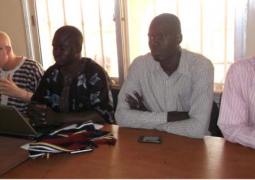A
four-day meeting of experts in charge of meteorological services begun in
Abuja, Nigeria, on Tuesday to provide important insights into climate change
and weather management as the most critical and interconnected challenges of
the sub-region.
West Africa needs a robust response to issues
relating to climate change as livelihoods in the area continue to depend
heavily on the climate system while agriculture and the extraction of
non-mineral natural resources remain the major sectors for food production and
employment for more than 60 per cent of the active population.
Welcoming delegates to the 12th Meeting of the
Committee of Directors of National Meteorological Services, the ECOWAS
Commissioner for Agriculture, Environment and Water Resources, Tchambakou
Ayassor, charged the participants to ensure that all the issues having to do
with the ECOWAS Strategic Programme on Meteorology Services are covered during
the meeting.
The commissioner noted that ECOWAS was
particularly concerned with the need to reduce the vulnerability of citizens as
experts push for adaptation to climate change in West Africa.
According
to him, more than 75 per cent of the population in the areas are affected by
climate change and are exposed to incidences of draughts and storms. He added that both the environment and
non-environment initiatives should be taken into consideration in going
forward.
He thanked the government of Sweden for
working strenuously with the ECOWAS Commission and other relevant agencies to
ensure that West Africa is on top of the vagaries of climate change.
Declaring the workshop open, the Nigerian
Minister of Transport Rotimi Amaechi said the workshop could not have come at a
more auspicious time than now when extreme weather events such as
thunderstorms, dust, gusty winds, floods, ocean surges, costal and gully
erosions as well as drought and desertification in the sub-region region has
continued to increase in intensity and frequency.
The
resultant effect, he said, on society and economy is increased poverty, diseases
and underdevelopment.
In his remark, the chairman of the Directors
of National Meteorological and Hydrological Services (NMHSs) in ECOWAS member
states, Lamin Mai Touray, noted that as climate change intensifies today, the
need for adaptation through appropriate climate risk management strategies to
support livelihoods and to save lives and property have become more imperative
than ever before.
He added that the inhibiting situation calls
for greater support to the region’s NMHSs, if they are to play their roles
effectively in national development as well as keep up with their international
obligations.
Read Other Articles In Article (Archive)



